Airbnb: Analysis of Performance, Structure, Behavior & Macroeconomics
VerifiedAdded on 2023/05/29
|6
|2309
|459
Essay
AI Summary
This essay provides a comprehensive analysis of Airbnb's business model and its macroeconomic impact. It begins with an introduction to Airbnb, describing it as an online marketplace connecting travelers with hosts, and briefly outlines its historical background, tracing its origins to collaborative consumption and the sharing economy. The analysis is grounded in game theory, emphasizing trust and mutual benefit. The essay examines Airbnb's behavior, focusing on community standards such as safety, security, fairness, authenticity, and reliability. It also segments Airbnb's business into hosts, guests/travelers, and freelance photographers, highlighting the value proposition for each. The impact of Airbnb on the economy is discussed, noting its contribution to job creation, tax revenue, and improved living standards. The essay also addresses the risks associated with the business, including fraud, vandalism, and regulatory challenges. It concludes by examining Airbnb's response to the economy, emphasizing its role in providing income opportunities for suppliers, increasing demand, and reducing poverty.
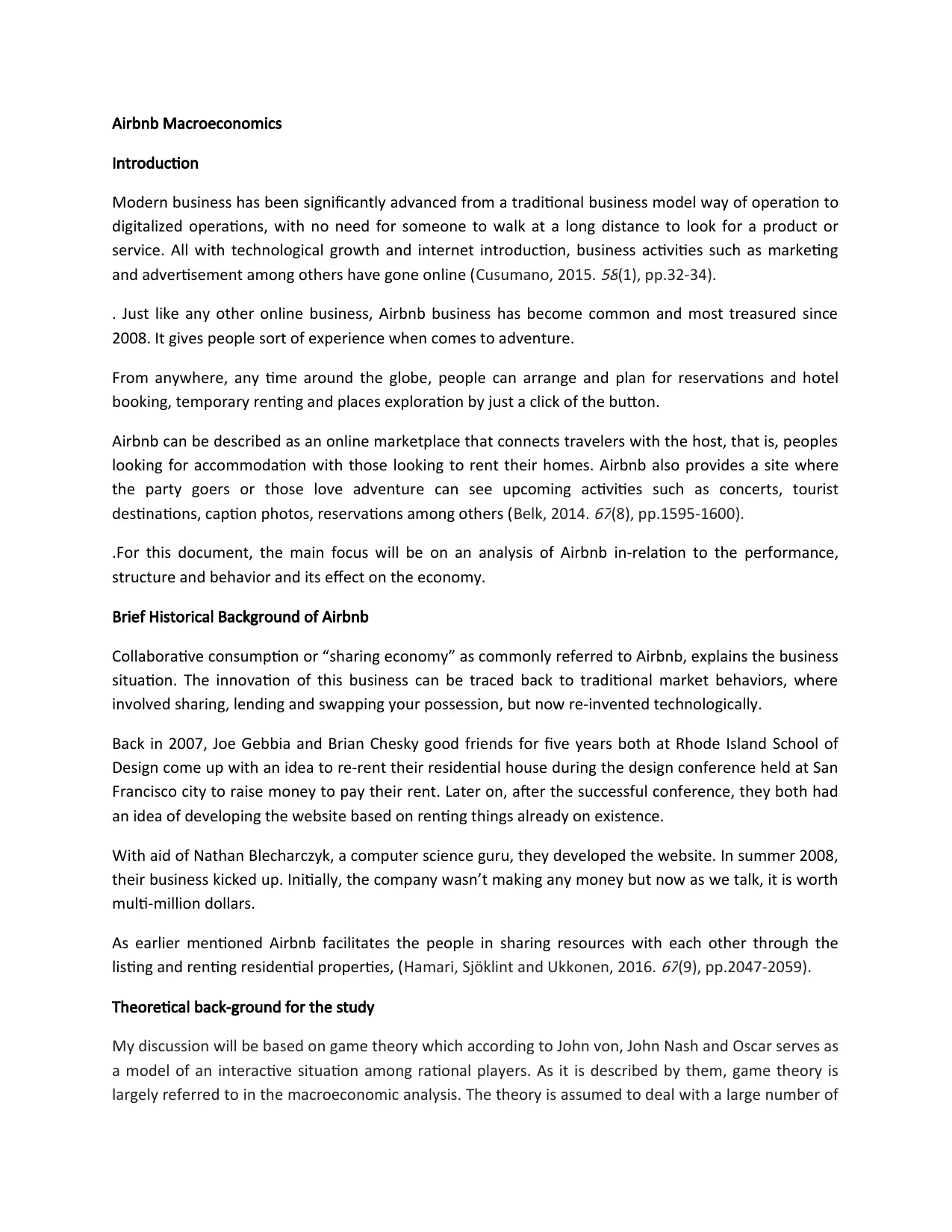
Airbnb Macroeconomics
Introduction
Modern business has been significantly advanced from a traditional business model way of operation to
digitalized operations, with no need for someone to walk at a long distance to look for a product or
service. All with technological growth and internet introduction, business activities such as marketing
and advertisement among others have gone online (Cusumano, 2015.
58(1), pp.32-34).
. Just like any other online business, Airbnb business has become common and most treasured since
2008. It gives people sort of experience when comes to adventure.
From anywhere, any time around the globe, people can arrange and plan for reservations and hotel
booking, temporary renting and places exploration by just a click of the button.
Airbnb can be described as an online marketplace that connects travelers with the host, that is, peoples
looking for accommodation with those looking to rent their homes. Airbnb also provides a site where
the party goers or those love adventure can see upcoming activities such as concerts, tourist
destinations, caption photos, reservations among others (Belk, 2014.
67(8), pp.1595-1600).
.For this document, the main focus will be on an analysis of Airbnb in-relation to the performance,
structure and behavior and its effect on the economy.
Brief Historical Background of Airbnb
Collaborative consumption or “sharing economy” as commonly referred to Airbnb, explains the business
situation. The innovation of this business can be traced back to traditional market behaviors, where
involved sharing, lending and swapping your possession, but now re-invented technologically.
Back in 2007, Joe Gebbia and Brian Chesky good friends for five years both at Rhode Island School of
Design come up with an idea to re-rent their residential house during the design conference held at San
Francisco city to raise money to pay their rent. Later on, after the successful conference, they both had
an idea of developing the website based on renting things already on existence.
With aid of Nathan Blecharczyk, a computer science guru, they developed the website. In summer 2008,
their business kicked up. Initially, the company wasn’t making any money but now as we talk, it is worth
multi-million dollars.
As earlier mentioned Airbnb facilitates the people in sharing resources with each other through the
listing and renting residential properties, (Hamari, Sjöklint and Ukkonen, 2016.
67(9), pp.2047-2059).
Theoretical back-ground for the study
My discussion will be based on game theory which according to John von, John Nash and Oscar serves as
a model of an interactive situation among rational players. As it is described by them, game theory is
largely referred to in the macroeconomic analysis. The theory is assumed to deal with a large number of
Introduction
Modern business has been significantly advanced from a traditional business model way of operation to
digitalized operations, with no need for someone to walk at a long distance to look for a product or
service. All with technological growth and internet introduction, business activities such as marketing
and advertisement among others have gone online (Cusumano, 2015.
58(1), pp.32-34).
. Just like any other online business, Airbnb business has become common and most treasured since
2008. It gives people sort of experience when comes to adventure.
From anywhere, any time around the globe, people can arrange and plan for reservations and hotel
booking, temporary renting and places exploration by just a click of the button.
Airbnb can be described as an online marketplace that connects travelers with the host, that is, peoples
looking for accommodation with those looking to rent their homes. Airbnb also provides a site where
the party goers or those love adventure can see upcoming activities such as concerts, tourist
destinations, caption photos, reservations among others (Belk, 2014.
67(8), pp.1595-1600).
.For this document, the main focus will be on an analysis of Airbnb in-relation to the performance,
structure and behavior and its effect on the economy.
Brief Historical Background of Airbnb
Collaborative consumption or “sharing economy” as commonly referred to Airbnb, explains the business
situation. The innovation of this business can be traced back to traditional market behaviors, where
involved sharing, lending and swapping your possession, but now re-invented technologically.
Back in 2007, Joe Gebbia and Brian Chesky good friends for five years both at Rhode Island School of
Design come up with an idea to re-rent their residential house during the design conference held at San
Francisco city to raise money to pay their rent. Later on, after the successful conference, they both had
an idea of developing the website based on renting things already on existence.
With aid of Nathan Blecharczyk, a computer science guru, they developed the website. In summer 2008,
their business kicked up. Initially, the company wasn’t making any money but now as we talk, it is worth
multi-million dollars.
As earlier mentioned Airbnb facilitates the people in sharing resources with each other through the
listing and renting residential properties, (Hamari, Sjöklint and Ukkonen, 2016.
67(9), pp.2047-2059).
Theoretical back-ground for the study
My discussion will be based on game theory which according to John von, John Nash and Oscar serves as
a model of an interactive situation among rational players. As it is described by them, game theory is
largely referred to in the macroeconomic analysis. The theory is assumed to deal with a large number of
Paraphrase This Document
Need a fresh take? Get an instant paraphrase of this document with our AI Paraphraser
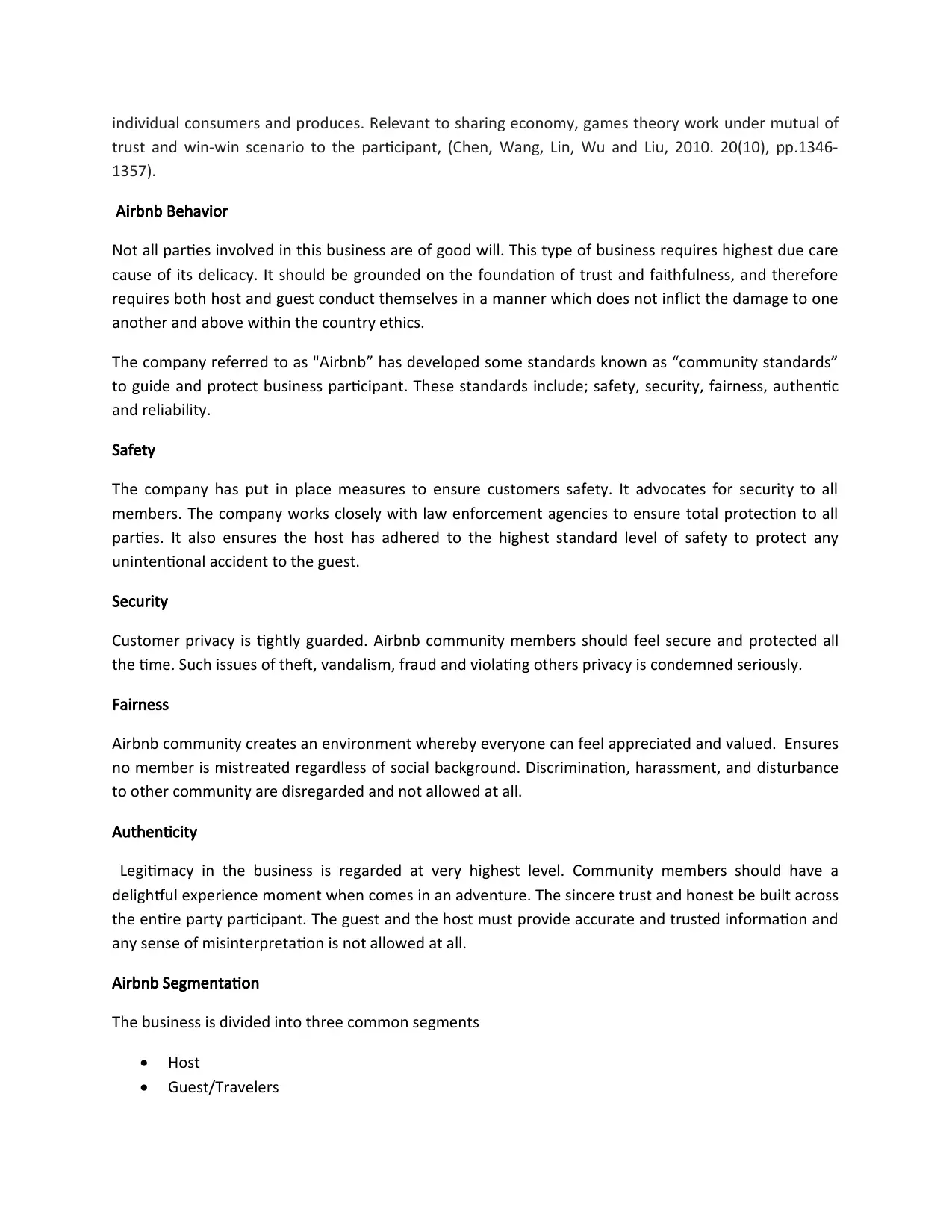
individual consumers and produces. Relevant to sharing economy, games theory work under mutual of
trust and win-win scenario to the participant, (Chen, Wang, Lin, Wu and Liu, 2010. 20(10), pp.1346-
1357).
Airbnb Behavior
Not all parties involved in this business are of good will. This type of business requires highest due care
cause of its delicacy. It should be grounded on the foundation of trust and faithfulness, and therefore
requires both host and guest conduct themselves in a manner which does not inflict the damage to one
another and above within the country ethics.
The company referred to as "Airbnb” has developed some standards known as “community standards”
to guide and protect business participant. These standards include; safety, security, fairness, authentic
and reliability.
Safety
The company has put in place measures to ensure customers safety. It advocates for security to all
members. The company works closely with law enforcement agencies to ensure total protection to all
parties. It also ensures the host has adhered to the highest standard level of safety to protect any
unintentional accident to the guest.
Security
Customer privacy is tightly guarded. Airbnb community members should feel secure and protected all
the time. Such issues of theft, vandalism, fraud and violating others privacy is condemned seriously.
Fairness
Airbnb community creates an environment whereby everyone can feel appreciated and valued. Ensures
no member is mistreated regardless of social background. Discrimination, harassment, and disturbance
to other community are disregarded and not allowed at all.
Authenticity
Legitimacy in the business is regarded at very highest level. Community members should have a
delightful experience moment when comes in an adventure. The sincere trust and honest be built across
the entire party participant. The guest and the host must provide accurate and trusted information and
any sense of misinterpretation is not allowed at all.
Airbnb Segmentation
The business is divided into three common segments
Host
Guest/Travelers
trust and win-win scenario to the participant, (Chen, Wang, Lin, Wu and Liu, 2010. 20(10), pp.1346-
1357).
Airbnb Behavior
Not all parties involved in this business are of good will. This type of business requires highest due care
cause of its delicacy. It should be grounded on the foundation of trust and faithfulness, and therefore
requires both host and guest conduct themselves in a manner which does not inflict the damage to one
another and above within the country ethics.
The company referred to as "Airbnb” has developed some standards known as “community standards”
to guide and protect business participant. These standards include; safety, security, fairness, authentic
and reliability.
Safety
The company has put in place measures to ensure customers safety. It advocates for security to all
members. The company works closely with law enforcement agencies to ensure total protection to all
parties. It also ensures the host has adhered to the highest standard level of safety to protect any
unintentional accident to the guest.
Security
Customer privacy is tightly guarded. Airbnb community members should feel secure and protected all
the time. Such issues of theft, vandalism, fraud and violating others privacy is condemned seriously.
Fairness
Airbnb community creates an environment whereby everyone can feel appreciated and valued. Ensures
no member is mistreated regardless of social background. Discrimination, harassment, and disturbance
to other community are disregarded and not allowed at all.
Authenticity
Legitimacy in the business is regarded at very highest level. Community members should have a
delightful experience moment when comes in an adventure. The sincere trust and honest be built across
the entire party participant. The guest and the host must provide accurate and trusted information and
any sense of misinterpretation is not allowed at all.
Airbnb Segmentation
The business is divided into three common segments
Host
Guest/Travelers
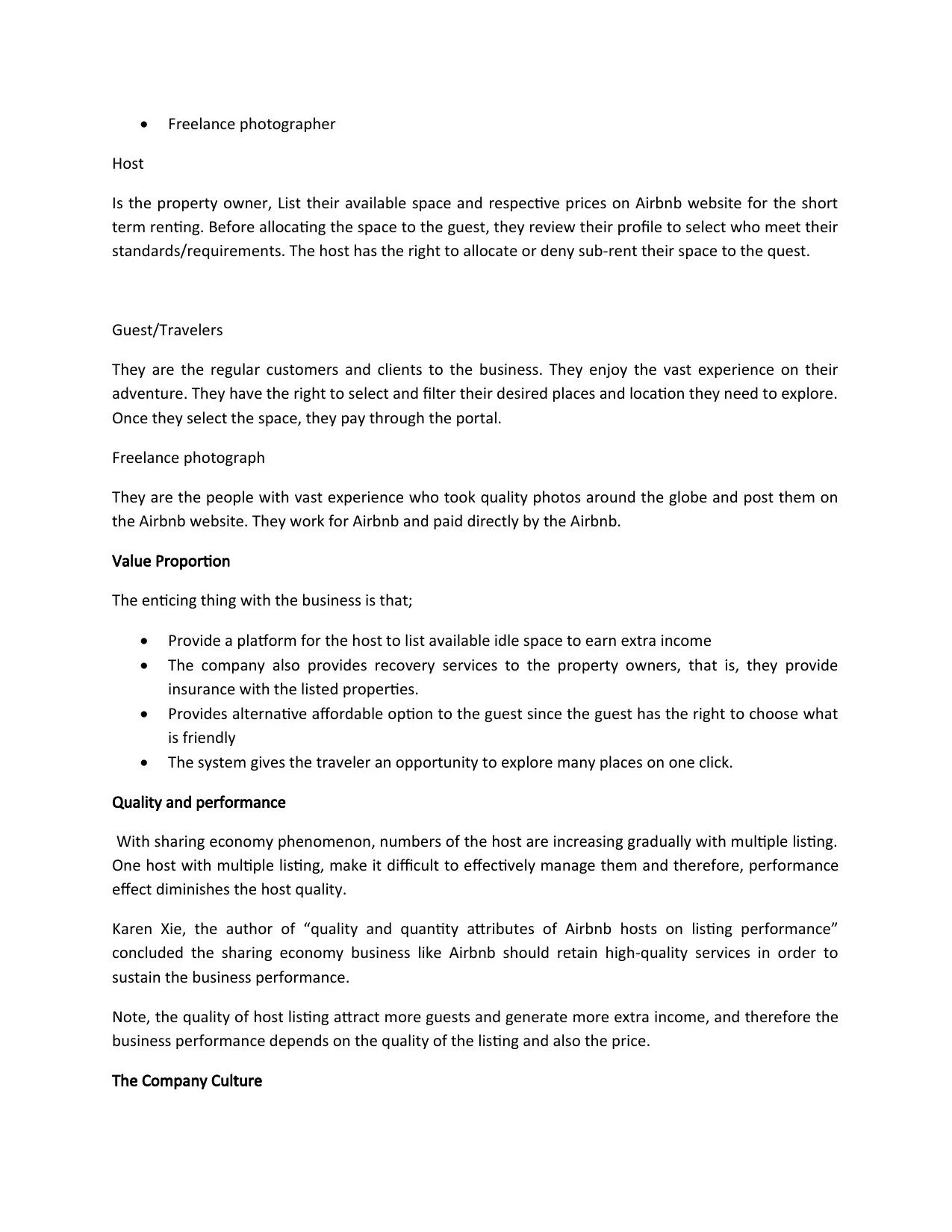
Freelance photographer
Host
Is the property owner, List their available space and respective prices on Airbnb website for the short
term renting. Before allocating the space to the guest, they review their profile to select who meet their
standards/requirements. The host has the right to allocate or deny sub-rent their space to the quest.
Guest/Travelers
They are the regular customers and clients to the business. They enjoy the vast experience on their
adventure. They have the right to select and filter their desired places and location they need to explore.
Once they select the space, they pay through the portal.
Freelance photograph
They are the people with vast experience who took quality photos around the globe and post them on
the Airbnb website. They work for Airbnb and paid directly by the Airbnb.
Value Proportion
The enticing thing with the business is that;
Provide a platform for the host to list available idle space to earn extra income
The company also provides recovery services to the property owners, that is, they provide
insurance with the listed properties.
Provides alternative affordable option to the guest since the guest has the right to choose what
is friendly
The system gives the traveler an opportunity to explore many places on one click.
Quality and performance
With sharing economy phenomenon, numbers of the host are increasing gradually with multiple listing.
One host with multiple listing, make it difficult to effectively manage them and therefore, performance
effect diminishes the host quality.
Karen Xie, the author of “quality and quantity attributes of Airbnb hosts on listing performance”
concluded the sharing economy business like Airbnb should retain high-quality services in order to
sustain the business performance.
Note, the quality of host listing attract more guests and generate more extra income, and therefore the
business performance depends on the quality of the listing and also the price.
The Company Culture
Host
Is the property owner, List their available space and respective prices on Airbnb website for the short
term renting. Before allocating the space to the guest, they review their profile to select who meet their
standards/requirements. The host has the right to allocate or deny sub-rent their space to the quest.
Guest/Travelers
They are the regular customers and clients to the business. They enjoy the vast experience on their
adventure. They have the right to select and filter their desired places and location they need to explore.
Once they select the space, they pay through the portal.
Freelance photograph
They are the people with vast experience who took quality photos around the globe and post them on
the Airbnb website. They work for Airbnb and paid directly by the Airbnb.
Value Proportion
The enticing thing with the business is that;
Provide a platform for the host to list available idle space to earn extra income
The company also provides recovery services to the property owners, that is, they provide
insurance with the listed properties.
Provides alternative affordable option to the guest since the guest has the right to choose what
is friendly
The system gives the traveler an opportunity to explore many places on one click.
Quality and performance
With sharing economy phenomenon, numbers of the host are increasing gradually with multiple listing.
One host with multiple listing, make it difficult to effectively manage them and therefore, performance
effect diminishes the host quality.
Karen Xie, the author of “quality and quantity attributes of Airbnb hosts on listing performance”
concluded the sharing economy business like Airbnb should retain high-quality services in order to
sustain the business performance.
Note, the quality of host listing attract more guests and generate more extra income, and therefore the
business performance depends on the quality of the listing and also the price.
The Company Culture
⊘ This is a preview!⊘
Do you want full access?
Subscribe today to unlock all pages.

Trusted by 1+ million students worldwide
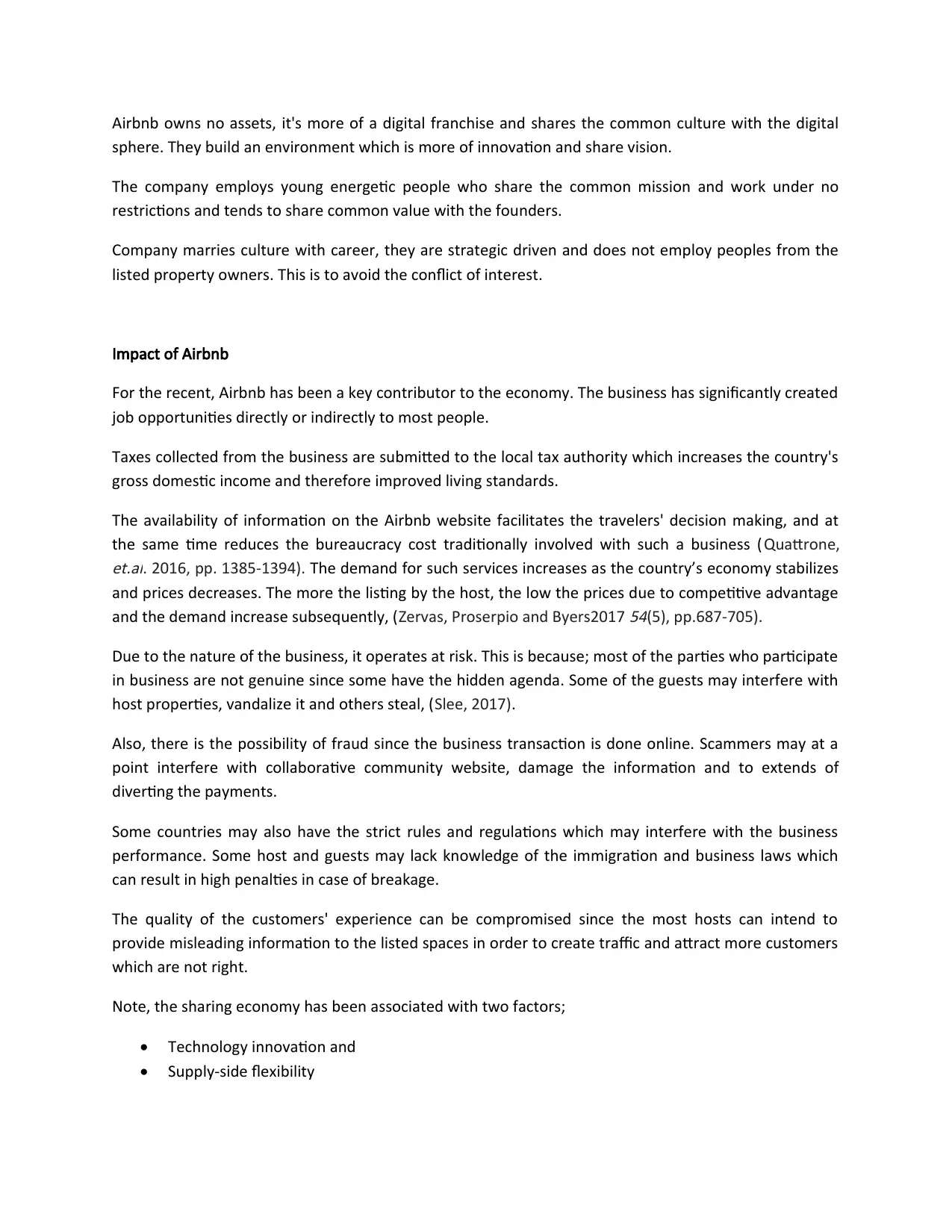
Airbnb owns no assets, it's more of a digital franchise and shares the common culture with the digital
sphere. They build an environment which is more of innovation and share vision.
The company employs young energetic people who share the common mission and work under no
restrictions and tends to share common value with the founders.
Company marries culture with career, they are strategic driven and does not employ peoples from the
listed property owners. This is to avoid the conflict of interest.
Impact of Airbnb
For the recent, Airbnb has been a key contributor to the economy. The business has significantly created
job opportunities directly or indirectly to most people.
Taxes collected from the business are submitted to the local tax authority which increases the country's
gross domestic income and therefore improved living standards.
The availability of information on the Airbnb website facilitates the travelers' decision making, and at
the same time reduces the bureaucracy cost traditionally involved with such a business ( Quattrone,et.al. 2016, pp. 1385-1394). The demand for such services increases as the country’s economy stabilizes
and prices decreases. The more the listing by the host, the low the prices due to competitive advantage
and the demand increase subsequently, (Zervas, Proserpio and Byers2017
54(5), pp.687-705).
Due to the nature of the business, it operates at risk. This is because; most of the parties who participate
in business are not genuine since some have the hidden agenda. Some of the guests may interfere with
host properties, vandalize it and others steal, (Slee, 2017).
Also, there is the possibility of fraud since the business transaction is done online. Scammers may at a
point interfere with collaborative community website, damage the information and to extends of
diverting the payments.
Some countries may also have the strict rules and regulations which may interfere with the business
performance. Some host and guests may lack knowledge of the immigration and business laws which
can result in high penalties in case of breakage.
The quality of the customers' experience can be compromised since the most hosts can intend to
provide misleading information to the listed spaces in order to create traffic and attract more customers
which are not right.
Note, the sharing economy has been associated with two factors;
Technology innovation and
Supply-side flexibility
sphere. They build an environment which is more of innovation and share vision.
The company employs young energetic people who share the common mission and work under no
restrictions and tends to share common value with the founders.
Company marries culture with career, they are strategic driven and does not employ peoples from the
listed property owners. This is to avoid the conflict of interest.
Impact of Airbnb
For the recent, Airbnb has been a key contributor to the economy. The business has significantly created
job opportunities directly or indirectly to most people.
Taxes collected from the business are submitted to the local tax authority which increases the country's
gross domestic income and therefore improved living standards.
The availability of information on the Airbnb website facilitates the travelers' decision making, and at
the same time reduces the bureaucracy cost traditionally involved with such a business ( Quattrone,et.al. 2016, pp. 1385-1394). The demand for such services increases as the country’s economy stabilizes
and prices decreases. The more the listing by the host, the low the prices due to competitive advantage
and the demand increase subsequently, (Zervas, Proserpio and Byers2017
54(5), pp.687-705).
Due to the nature of the business, it operates at risk. This is because; most of the parties who participate
in business are not genuine since some have the hidden agenda. Some of the guests may interfere with
host properties, vandalize it and others steal, (Slee, 2017).
Also, there is the possibility of fraud since the business transaction is done online. Scammers may at a
point interfere with collaborative community website, damage the information and to extends of
diverting the payments.
Some countries may also have the strict rules and regulations which may interfere with the business
performance. Some host and guests may lack knowledge of the immigration and business laws which
can result in high penalties in case of breakage.
The quality of the customers' experience can be compromised since the most hosts can intend to
provide misleading information to the listed spaces in order to create traffic and attract more customers
which are not right.
Note, the sharing economy has been associated with two factors;
Technology innovation and
Supply-side flexibility
Paraphrase This Document
Need a fresh take? Get an instant paraphrase of this document with our AI Paraphraser
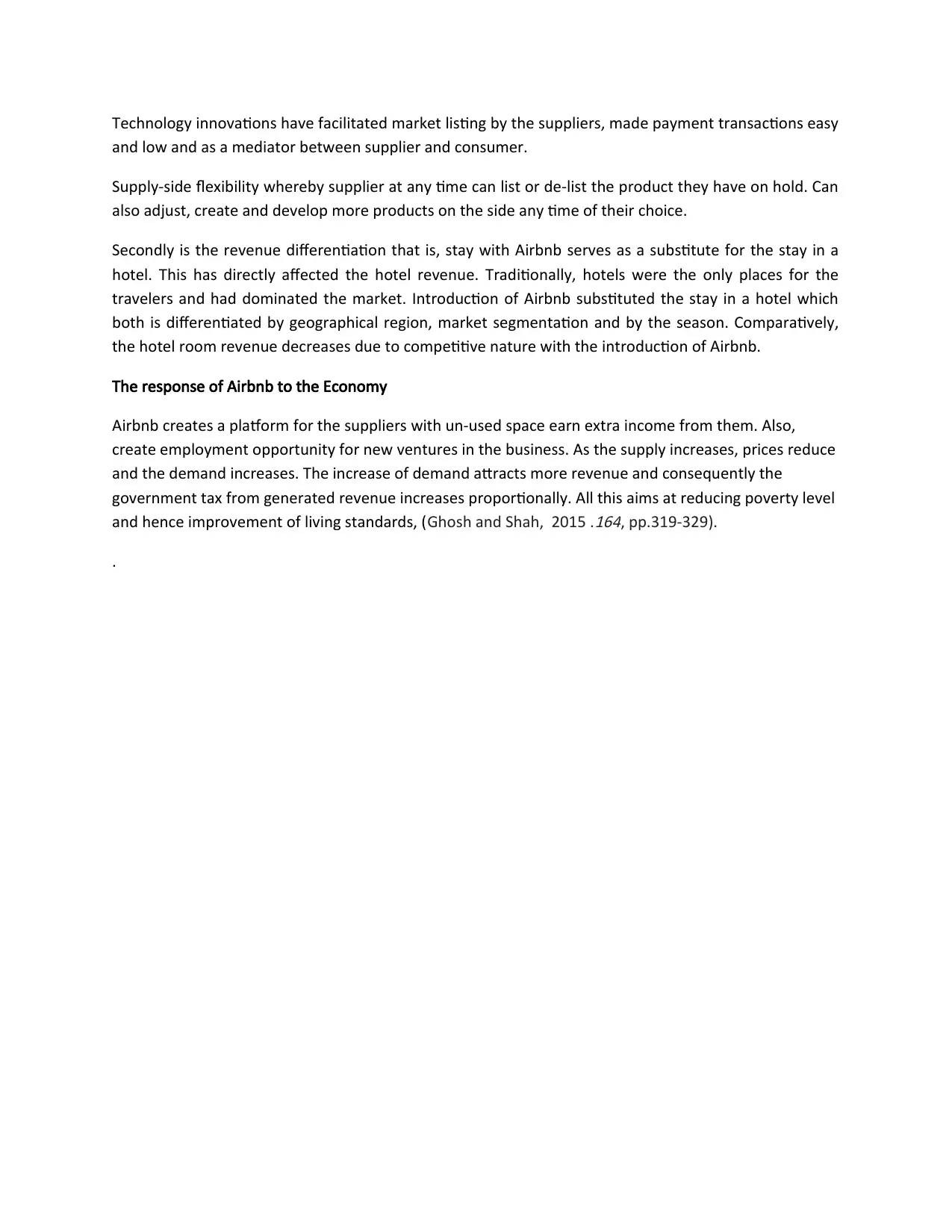
Technology innovations have facilitated market listing by the suppliers, made payment transactions easy
and low and as a mediator between supplier and consumer.
Supply-side flexibility whereby supplier at any time can list or de-list the product they have on hold. Can
also adjust, create and develop more products on the side any time of their choice.
Secondly is the revenue differentiation that is, stay with Airbnb serves as a substitute for the stay in a
hotel. This has directly affected the hotel revenue. Traditionally, hotels were the only places for the
travelers and had dominated the market. Introduction of Airbnb substituted the stay in a hotel which
both is differentiated by geographical region, market segmentation and by the season. Comparatively,
the hotel room revenue decreases due to competitive nature with the introduction of Airbnb.
The response of Airbnb to the Economy
Airbnb creates a platform for the suppliers with un-used space earn extra income from them. Also,
create employment opportunity for new ventures in the business. As the supply increases, prices reduce
and the demand increases. The increase of demand attracts more revenue and consequently the
government tax from generated revenue increases proportionally. All this aims at reducing poverty level
and hence improvement of living standards, (Ghosh and Shah, 2015 .
164, pp.319-329).
.
and low and as a mediator between supplier and consumer.
Supply-side flexibility whereby supplier at any time can list or de-list the product they have on hold. Can
also adjust, create and develop more products on the side any time of their choice.
Secondly is the revenue differentiation that is, stay with Airbnb serves as a substitute for the stay in a
hotel. This has directly affected the hotel revenue. Traditionally, hotels were the only places for the
travelers and had dominated the market. Introduction of Airbnb substituted the stay in a hotel which
both is differentiated by geographical region, market segmentation and by the season. Comparatively,
the hotel room revenue decreases due to competitive nature with the introduction of Airbnb.
The response of Airbnb to the Economy
Airbnb creates a platform for the suppliers with un-used space earn extra income from them. Also,
create employment opportunity for new ventures in the business. As the supply increases, prices reduce
and the demand increases. The increase of demand attracts more revenue and consequently the
government tax from generated revenue increases proportionally. All this aims at reducing poverty level
and hence improvement of living standards, (Ghosh and Shah, 2015 .
164, pp.319-329).
.
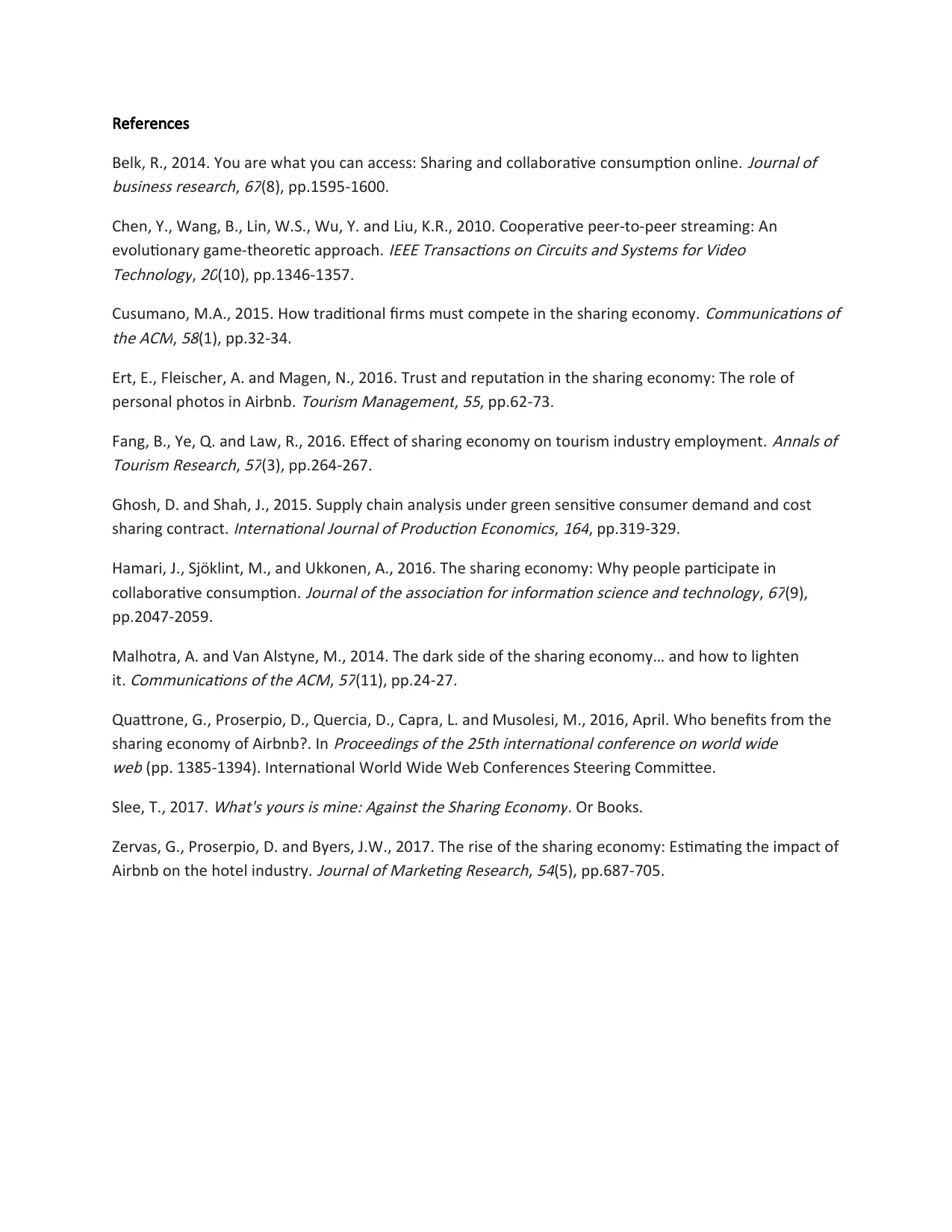
References
Belk, R., 2014. You are what you can access: Sharing and collaborative consumption online.
Journal of
business research,
67(8), pp.1595-1600.
Chen, Y., Wang, B., Lin, W.S., Wu, Y. and Liu, K.R., 2010. Cooperative peer-to-peer streaming: An
evolutionary game-theoretic approach.
IEEE Transactions on Circuits and Systems for Video
Technology,
20(10), pp.1346-1357.
Cusumano, M.A., 2015. How traditional firms must compete in the sharing economy.
Communications of
the ACM,
58(1), pp.32-34.
Ert, E., Fleischer, A. and Magen, N., 2016. Trust and reputation in the sharing economy: The role of
personal photos in Airbnb.
Tourism Management,
55, pp.62-73.
Fang, B., Ye, Q. and Law, R., 2016. Effect of sharing economy on tourism industry employment.
Annals of
Tourism Research,
57(3), pp.264-267.
Ghosh, D. and Shah, J., 2015. Supply chain analysis under green sensitive consumer demand and cost
sharing contract.
International Journal of Production Economics,
164, pp.319-329.
Hamari, J., Sjöklint, M., and Ukkonen, A., 2016. The sharing economy: Why people participate in
collaborative consumption.
Journal of the association for information science and technology,
67(9),
pp.2047-2059.
Malhotra, A. and Van Alstyne, M., 2014. The dark side of the sharing economy… and how to lighten
it.
Communications of the ACM,
57(11), pp.24-27.
Quattrone, G., Proserpio, D., Quercia, D., Capra, L. and Musolesi, M., 2016, April. Who benefits from the
sharing economy of Airbnb?. In
Proceedings of the 25th international conference on world wide
web (pp. 1385-1394). International World Wide Web Conferences Steering Committee.
Slee, T., 2017.
What's yours is mine: Against the Sharing Economy. Or Books.
Zervas, G., Proserpio, D. and Byers, J.W., 2017. The rise of the sharing economy: Estimating the impact of
Airbnb on the hotel industry.
Journal of Marketing Research,
54(5), pp.687-705.
Belk, R., 2014. You are what you can access: Sharing and collaborative consumption online.
Journal of
business research,
67(8), pp.1595-1600.
Chen, Y., Wang, B., Lin, W.S., Wu, Y. and Liu, K.R., 2010. Cooperative peer-to-peer streaming: An
evolutionary game-theoretic approach.
IEEE Transactions on Circuits and Systems for Video
Technology,
20(10), pp.1346-1357.
Cusumano, M.A., 2015. How traditional firms must compete in the sharing economy.
Communications of
the ACM,
58(1), pp.32-34.
Ert, E., Fleischer, A. and Magen, N., 2016. Trust and reputation in the sharing economy: The role of
personal photos in Airbnb.
Tourism Management,
55, pp.62-73.
Fang, B., Ye, Q. and Law, R., 2016. Effect of sharing economy on tourism industry employment.
Annals of
Tourism Research,
57(3), pp.264-267.
Ghosh, D. and Shah, J., 2015. Supply chain analysis under green sensitive consumer demand and cost
sharing contract.
International Journal of Production Economics,
164, pp.319-329.
Hamari, J., Sjöklint, M., and Ukkonen, A., 2016. The sharing economy: Why people participate in
collaborative consumption.
Journal of the association for information science and technology,
67(9),
pp.2047-2059.
Malhotra, A. and Van Alstyne, M., 2014. The dark side of the sharing economy… and how to lighten
it.
Communications of the ACM,
57(11), pp.24-27.
Quattrone, G., Proserpio, D., Quercia, D., Capra, L. and Musolesi, M., 2016, April. Who benefits from the
sharing economy of Airbnb?. In
Proceedings of the 25th international conference on world wide
web (pp. 1385-1394). International World Wide Web Conferences Steering Committee.
Slee, T., 2017.
What's yours is mine: Against the Sharing Economy. Or Books.
Zervas, G., Proserpio, D. and Byers, J.W., 2017. The rise of the sharing economy: Estimating the impact of
Airbnb on the hotel industry.
Journal of Marketing Research,
54(5), pp.687-705.
⊘ This is a preview!⊘
Do you want full access?
Subscribe today to unlock all pages.

Trusted by 1+ million students worldwide
1 out of 6
Your All-in-One AI-Powered Toolkit for Academic Success.
+13062052269
info@desklib.com
Available 24*7 on WhatsApp / Email
![[object Object]](/_next/static/media/star-bottom.7253800d.svg)
Unlock your academic potential
Copyright © 2020–2026 A2Z Services. All Rights Reserved. Developed and managed by ZUCOL.